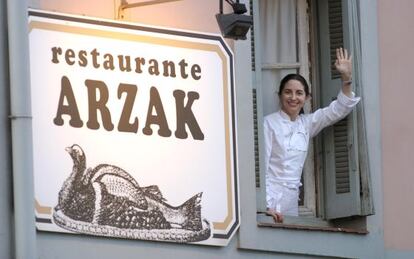The gastronomical year in review
What was hot in 2012, and what to expect to see on your plate over the next 12 months

The economic crisis has brought culinary pretentiousness down a notch or two. In fact, if the great Spanish avant-garde restaurants are surviving at all these days it is mostly thanks to spending by foreigners, who represent up to 80 percent of all customers.
Some of the trends that were on display last year are likely to be continued throughout 2013: tapas as an export business, a focus on local fare (both in terms of dishes and the wine list), sourcing from sustainable producers, a return to old-fashioned recipes with a modern twist (such as stews), and working under the patronage of hotels, since the high initial investment costs of setting up a new eatery are still holding back would-be entrepreneurs from taking the plunge.
Of course, there is still plenty of innovation going on at world-famous venues with long waiting lists, such as Arzak, El Celler de Can Roca, Mugaritz, Diverxo and Sant Pau. Some chefs are even going out on a limb and hoping for support from local diners, such as Quique Dacosta, who this year opened a restaurant in Valencia, El Poblet. Meanwhile, his other establishment in Dénia was awarded three Michelin stars, as was his Basque colleague Eneko Atxa, who works in the small town of Azurmendi.
A few places have shut down along the way (and not just in Spain - Chicago's famous Charlie Trotter is no more), but many more have opened up, seeking new ways to attract a broad public with little cash to spare.
Foreigners make up 80 percent of all customers at Spain's high-end eateries
- Gastronomy 2.0 These days, chefs are just as familiar with social media and smartphones as they are with their own kitchens. Dani García, for instance, kept an online diary of his trip to New York to open up a brasserie called Manzanilla. The Peruvian chef Gastón Acurio creates "reci-tweets," or recipes for Twitter, while Rodrigo de la Calle comes up with micro-recipes. Francis Paniego, winner of the National Gastronomy award, keeps a blog. As for the diners, cyberspace is the place to share their experiences at restaurants far and wide.
- Bullipedia. If anybody thought that Ferrán Adrià would become old news once elBulli closed, they were wrong. Until the arch-famous restaurant in Roses reopens in 2014 as the elBullifoundation, the hyperactive mind of the world's most influential chef continues to work at breakneck speed. His first step is Bullipedia, a project that seeks to encode contemporary cuisine into an encyclopedia of sorts. In 2012, Adrià created a tablet application called La comida de la familia (or, Family food), which suggests daily menus costing under five euros per person.
- Old meets new. The taverns of old are being reborn as multipurpose spaces where one can eat, read and shop in settings that range from retro to rural-chic. Mobile food stalls have experienced a boom just about everywhere - except in Spain, where they are constrained by strict legislation on street vending. In their place, pop-up venues have... well, popped up. One that was in particular demand was The Loaf, a makeshift bakery serving bread out on the streets of San Sebastián last summer. In Madrid, DiverXo chef David Muñoz created StreetXo, a Spanish take on Asian street markets.
- Going global. Spanish chefs are exporting their savoir-faire. Arzak will be working as an adviser to a restaurant located in London, while high-profile figures such as Marcos Morán, Paco Roncero, Ramón Freixa, Dani García, Sergi Arola and Martín Berasategui have also left their mark in many cities across the world.
- Foiegate. The end of 2012 will be remembered for the controversy surrounding Basque chef Andoni Luis Aduriz, whose restaurant bought foie from a local farm that did not comply with regulations covering health and humane treatment, according to a complaint by an animal rights group. Earlier in the year, Aduriz won the Witzigmann Innovation Award and founded the first international magazine specializing in science and gastronomy.
Tu suscripción se está usando en otro dispositivo
¿Quieres añadir otro usuario a tu suscripción?
Si continúas leyendo en este dispositivo, no se podrá leer en el otro.
FlechaTu suscripción se está usando en otro dispositivo y solo puedes acceder a EL PAÍS desde un dispositivo a la vez.
Si quieres compartir tu cuenta, cambia tu suscripción a la modalidad Premium, así podrás añadir otro usuario. Cada uno accederá con su propia cuenta de email, lo que os permitirá personalizar vuestra experiencia en EL PAÍS.
¿Tienes una suscripción de empresa? Accede aquí para contratar más cuentas.
En el caso de no saber quién está usando tu cuenta, te recomendamos cambiar tu contraseña aquí.
Si decides continuar compartiendo tu cuenta, este mensaje se mostrará en tu dispositivo y en el de la otra persona que está usando tu cuenta de forma indefinida, afectando a tu experiencia de lectura. Puedes consultar aquí los términos y condiciones de la suscripción digital.









































